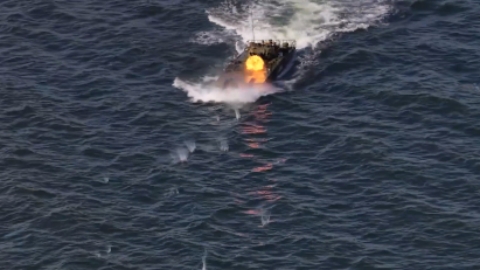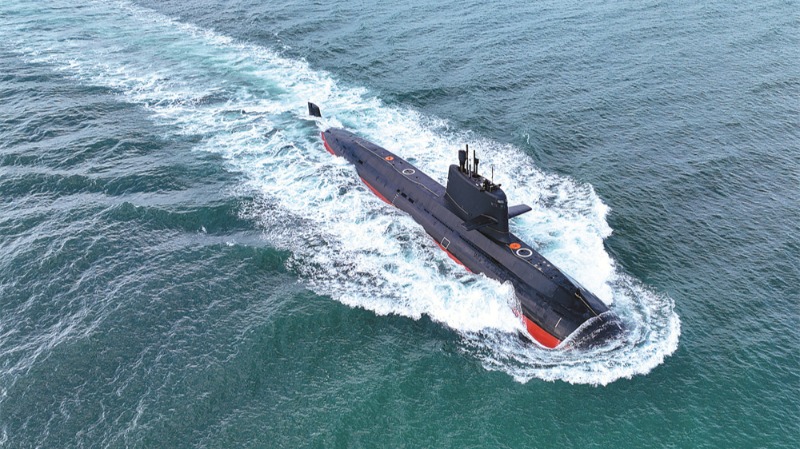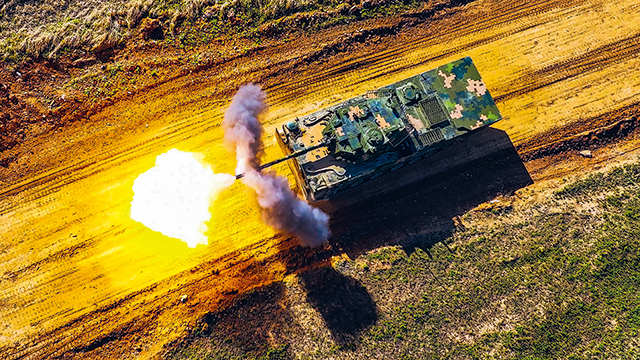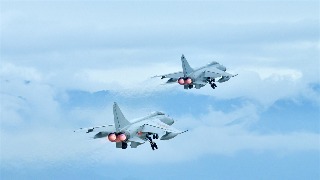By Zhao Yanan and Chen Yue
赵雅楠 陈岳
August 15 this year marks the 80th anniversary of Japan's announcement of unconditional surrender. Looking back, the aggressive wars launched by Japanese militarism once brought untold suffering to the peoples of Asian countries. After WWII, Japan implemented a pacifist constitution that explicitly restricted the development of its armed forces to prevent the resurgence of militarism. However, the specter of militarism has never left Japan and its right-wing forces have never abandoned their dream of becoming a military power. In recent years, in particular, driven by ambitions for military expansion and under the encouragement and connivance of the US, Japan has step by step hollowed out its pacifist constitution in an attempt to break away from the postwar system, which has aroused deep concern in the international community over a potential revival of militarism.
今年8月15日是日本宣布无条件投降80周年。回望历史,日本军国主义发动的侵略战争曾给亚洲各国人民带来深重灾难。二战结束后,为防止军国主义复活,日本施行和平宪法,明确限制军力发展。然而,军国主义的幽灵并未离开日本列岛,日本右翼势力从未放弃成为“军事大国”的迷梦。尤其是近年来,为谋求军事扩张,再加上美国的怂恿和纵容,日本一步步架空和平宪法,试图摆脱战后体制,引发国际社会对其军国主义复活的深刻忧虑。
Japan has been continuously breaking through restrictions to loosen the constraints on its military development. In April 2014, Japan approved the Three Principles on Transfer of Defense Equipment and Technology on the Cabinet meeting, drastically loosening restrictions on arms and technology exports. In essence, it has effectively scrapped the Three Principles on Arms Exports that had been in place for nearly half a century. In September 2015, the Japanese government forced through new security legislation despite widespread criticism that the move was unconstitutional, legalizing the exercise of collective self-defense and overseas deployments of the Japanese Self-Defense Forces (JSDF). In December 2022, the Japanese government formally adopted the National Security Strategy (NSS), the National Defense Strategy (NDS) and the Defense Buildup Program (DBP). These documents emphasize the capabilities to strike enemy bases, marking a shift from the long-standing exclusively defense-oriented policy to a posture that embraces preemptive strikes.
日本不断突破禁区为军事发展松绑。2014年4月,日本内阁会议通过“防卫装备转移三原则”,大幅放宽了武器装备和技术出口限制,实质上废除了实施近半个世纪的“武器出口三原则”。2015年9月,日本政府不顾违宪争议强行通过新安保法案,使自卫队行使集体自卫权和向海外派兵“法律化”。2022年12月,日本政府正式通过新版《国家安全保障战略》《国家防卫战略》《防卫力量整备计划》等三份安保政策文件,强调发展“对敌基地攻击能力”,标志着战后日本安保政策发生重大转变,由“专守防卫”转向“先发制人”。
Japan has been pursuing the development of offensive military capabilities. First, Japan has sharply increased its defense budget. Since fiscal year 2023, the annual defense spending of Japan has consecutively exceeded 6 trillion, 7 trillion, and 8 trillion yen. Under the three new national security documents, Japan plans to raise defense spending to 2% of its GDP in fiscal year 2027. This unprecedented level of defense investment breaks the post-war convention, long observed by Japanese governments, of keeping the defense budget below 1% of GDP, and will provide substantial financial backing for its military expansion. Second, Japan has constructed the capabilities to strike enemy bases by the JSDF. In recent years, it has pushed forward the development of hypersonic and ballistic missile technologies, deployed various types of anti-ship missiles, and introduced offensive weapons such as Tomahawk cruise missiles to enhance its standoff strike capability. Third, Japan has sought to acquire combat capabilities in emerging domains. From establishing a Space Operations Squadron, to expanding the size and mission scope of the JSDF Cyber Defense Unit, and accelerating the formation of electronic warfare units in Japan's southwestern regions...Tokyo has been steadily enhancing its military footprint in space, cyberspace, and the electromagnetic spectrum. Moreover, it is integrating these "new-type forces" with conventional land, sea, and air power, aiming to use such capabilities as force multipliers to bolster its overall military strength.
寻求发展进攻性军事能力。一是大幅提高防卫预算。自2023财年起,日本防卫预算连续突破6万亿、7万亿、8万亿日元。根据新“安保三文件”,日本计划将2027财年防卫预算增加到占国内生产总值的2%。如此高额的防卫投入,打破了战后日本政府基本遵循的防卫费占国内生产总值不超过1%的惯例,将为日本军事扩张提供资金支持。二是构筑自卫队“反击能力”。日本近年来不断推动发展高超音速导弹和弹道导弹技术,部署多类型反舰导弹,并引进“战斧”巡航导弹等进攻性武器装备,以提升防区外打击能力。三是谋求新兴领域作战能力。从组建太空作战部队,到扩大自卫队网络防卫队编制和任务范围,再到加快在日本西南方向组建电子战部队……日本持续强化在太空、网络、电磁等新兴领域的军事能力,并推动其与陆海空传统领域军力建设融合发展,意图借助“新质战力”来赋能传统军事力量,进而提升日本整体军事实力。
Japan has continued to build an extensive military cooperation network. Following the removal of restrictions on the right of collective self-defense, Tokyo has gradually established a legal pretext for external defense cooperation, using it to intensify military interactions with other countries and push toward military normalization, which further undermines the constraints of the pacifist constitution. On the one hand, Japan has been deepening the Japan-US alliance. Through setting up the JSDF Joint Operations Command (JJOC), expanding the scale and frequency of joint drills with US forces, and upgrading bilateral defense and security cooperation, Japan has been actively cooperating with Washington’s military posture and force deployments in the so-called Indo-Pacific region. In doing so, Japan not only boosts its military capabilities but also secures tacit US support for loosening the post-war restrictions on its armed forces. On the other hand, Tokyo has been using military ties to court other partners. It has signed Reciprocal Access Agreements (RAA) with Australia, the UK, and the Philippines in an attempt to secure more footholds for the overseas presence of the JSDF. At the same time, Japan has stepped up military engagement with NATO, steadily strengthening institutionalized cooperation under the banner of exchanges and joint activities. In essence, these moves serve to promote its own military buildup.
持续打造军事合作网络。解禁集体自卫权后,日本逐步确立了对外防务合作的法理“正当性”,开始不断加强与相关国家的军事互动,谋求“军事正常化”,进一步突破了和平宪法限制。一方面,日本持续深化日美同盟,通过新设“统合作战司令部”、加大与美军演训规模与频率、升级与美防务安全合作等方式,积极配合美国在印太地区的军事布局和兵力部署调整,在提升自身军事能力的同时,换取美对其军事松绑的默许和支持。另一方面,日本通过军事纽带拉拢相关国家,先后与澳大利亚、英国以及菲律宾签署《互惠准入协定》,企图为自卫队的海外存在寻找更多立足点。此外,日本还加紧与北约军事勾连,持续强化与北约的机制化合作,以合作交流之名为自身军事发展造势。
Any betrayal of historical truth will, in the end, face the judgment of justice. On the occasion of the 80th anniversary of the victory in the Chinese People's War of Resistance Against Japanese Aggression and the World Anti-Fascist War, Japan's series of unprecedented military moves is drawing scrutiny from its Asian neighbors and the international community. As a defeated nation of WWII, Japan has the responsibility to draw lessons from history, honor the pacifist constitution, and genuinely pursue friendship with neighbors and peaceful development. The peace-loving people of the world must never forget the history written in blood and sacrifice. They must remain vigilant against any resurgence of Japanese militarism, firmly defend the victorious outcomes of WWII, and jointly create a better future for all of humanity.
任何对历史的背叛,终将招致正义的审判。在纪念中国人民抗日战争暨世界反法西斯战争胜利80周年之际,亚洲邻国和国际社会正以高度警惕的目光,审视日本在军事领域的一系列突破性举措。作为二战战败国,日本理应以史为鉴,恪守和平宪法,真正实现与邻为善、和平发展。全世界珍爱和平的人民必须牢记用鲜血和生命书写的历史,时刻警惕日本军国主义死灰复燃,坚定捍卫二战胜利成果,共同创造人类更加美好的未来。
(The author is from the PLA Academy of Military Sciences.)
(作者单位:军事科学院)




















